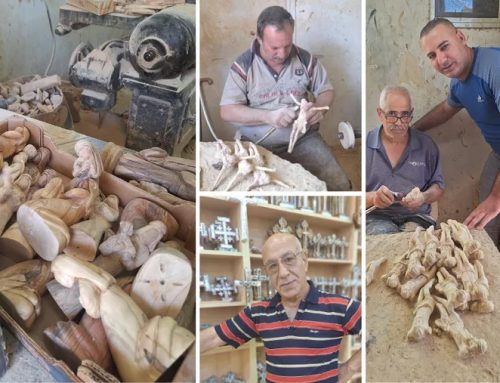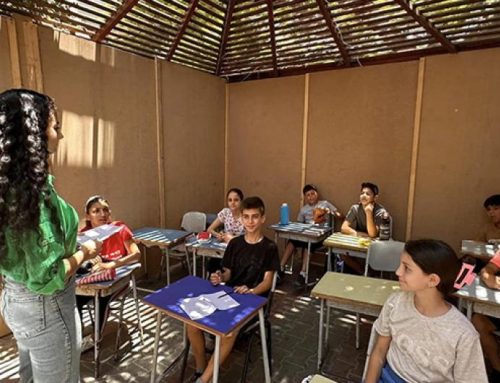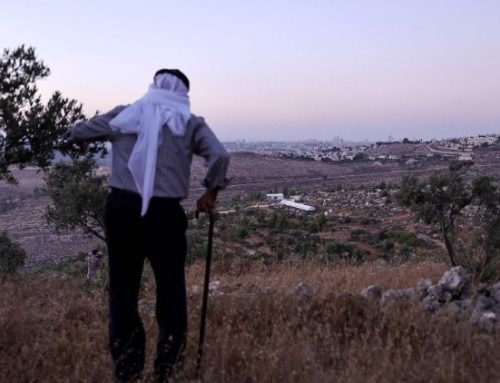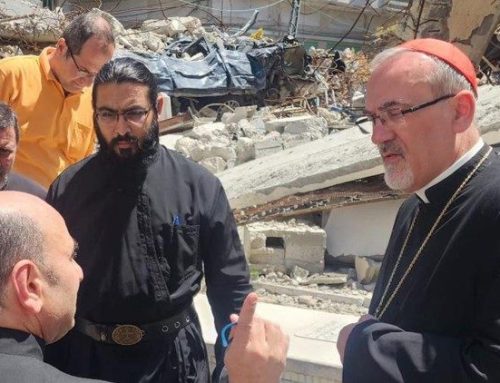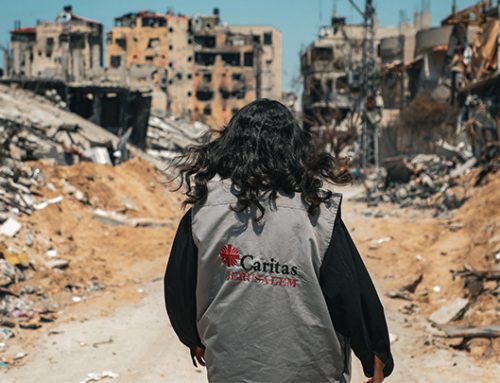The Vatican’s Secretary for Relations with States, Archbishop Paul Gallagher, has appealed for increased funding to support refugees from the Syrian crisis, saying the Holy See will “continue its humanitarian assistance” to the region over the coming year.
The Vatican ‘foreign minister’ was speaking at a conference in London on Thursday entitled ‘Supporting Syria and the Region’. The one day meeting, organised by the British government in partnership with Germany, Kuwait, Norway and the United Nations, focused not only on the emergency humanitarian needs of Syrian refugees but also on providing longer term support through jobs, education and economic development of host countries in the region.
In his statement Archbishop Gallagher highlighted the deaths and “ever-increasing human suffering” in Syria as the conflict enters its sixth year. In particular he mentioned the malnourishment of children and other civilians trapped in besieged and hard-to-reach areas.
Holy See responded to Syria crisis from start of conflict
The Holy See, he said, through the Pontifical Council “Cor Unum”, and the Catholic Church, through its network of charitable agencies, have been responding to the humanitarian crisis in the region from the start of the conflict. Given the overwhelming humanitarian needs, he said the Holy See “joins its voice to the appeals for increased funding to help refugees and impacted host communities” such as Jordan, Lebanon, Iraq, Turkey and Egypt.
Existence of Christians in Middle East “gravely threatened”
In distributing aid, the Vatican diplomat noted, Catholic agencies make no distinction regarding the religious or ethnic identity of those in need and seek always to give priority to the most vulnerable victims. He said that Christians and other religious minorities suffer disproportionately the effects of war and social upheaval in the region, stressing that their very existence in the Middle East remains “gravely threatened”.
Here is the full statement by Archbishop Paul Gallagher, Secretary for the Holy See’s Relations with States
The Holy See is pleased to participate in the “Supporting Syria and the Region” Conference aimed at responding to the humanitarian crisis in Syria that is now, regrettably and painfully, entering into its sixth year. A crisis that is characterised by ever-increasing human suffering, including extreme cases of malnourishment of innocent children and other civilians, especially among the high number of people who are trapped in hard-to-reach and besieged areas and are deprived of essential humanitarian aid. Notwithstanding renewed hopes for the political resolution of the crisis, our humanitarian efforts are increasingly focused on not only emergency aid but also the medium and long-term needs of refugees and host countries. Therefore, the Holy See warmly welcomes the emphasis on providing education, jobs and economic development at this pledging conference.
As we address the humanitarian needs of this crisis, it behoves us to remember that the real cost of this humanitarian crisis is measured by the deaths and suffering of millions of our fellow human beings. In his recent address to the Diplomatic Corps accredited to the Holy See, on 11 January last, His Holiness Pope Francis recalled “the plea of thousands of people who weep as they flee horrific wars, persecutions and human rights violations, or political or social instability…forced to flee in order to escape unspeakable acts of cruelty towards vulnerable persons, such as children and the disabled, or martyrdom solely on account of their religion.” In looking ahead to the First World Humanitarian Summit, which will take place next May, His Holiness expressed his desire that this Summit “will succeed in its goal of placing the person and human dignity at the heart of every humanitarian response”.
The Holy See, through the Pontifical Council “Cor Unum”, and the Catholic Church, through its network of charitable agencies, have been responding to the humanitarian crisis in Syria and the region from the very beginning. The funding needs of many Catholic agencies and NGOs are already included in the United Nations Regional Refugee and Resilience Plan
In 2015, entities of the Catholic Church (dioceses, Catholic Church aid agencies and Catholic NGOs) with funds received from appeals promoted by national episcopal conferences, private donations of Catholic faithful throughout the world, and in partnership with Governments and International organisations, contributed to providing USD 150 million of humanitarian assistance of direct benefit to more than 4 million people. The following were the principal areas of priority for Catholic agencies in 2015:
Education: USD 37 million for education programmes in Lebanon and Jordan, for both refugees and impacted host communities; Food aid: USD 30 million, of which USD 25 million was distributed in Syria; Non-Food aid: approximately US 30 million in Syria and Iraq; Health: approximately US 16 million was provided to the health sector, particularly in Syria, Jordan and Iraq; and finally, accommodation: US 10 million for accommodation and lodging for refugees and IDPs. A further US 12 million of funds were used in the provision of direct cash assistance, water and sanitation, livelihood and socio-psychological assistance.
On this occasion, I wish to give assurances of the commitment of the Catholic Church to continue its humanitarian assistance in the coming year.
In distributing aid, Catholic agencies and entities make no distinction regarding the religious or ethnic identity of those requiring assistance, and seek always to give priority to the most vulnerable and to those most in need. Particularly vulnerable are religious minorities, including Christians, who suffer disproportionately the effects of war and social upheaval in the region. In fact, their very presence and existence are gravely threatened. For this reason, His Holiness Pope Francis has repeatedly called attention to the particular needs of Christians and religious minorities in the Middle East.
See also this blog post on the conference by Britain’s ambassador to the Holy See Nigel Baker
Source: Vatican Radio


